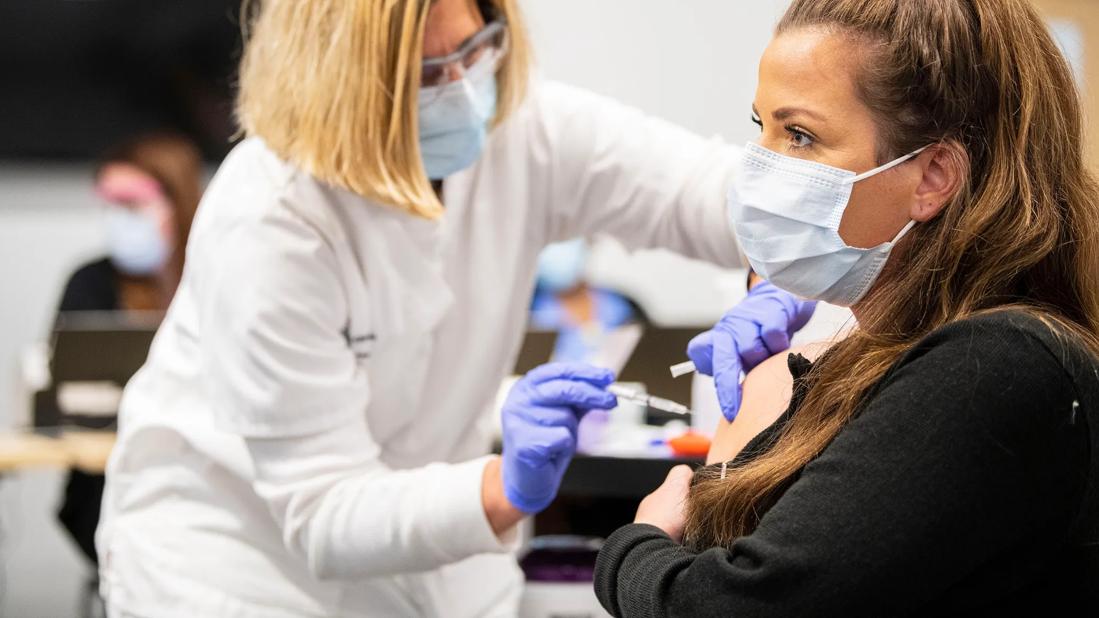Retiree group provides vaccines, administers tests amid pandemic-related surge

Image content: This image is available to view online.
View image online (https://assets.clevelandclinic.org/transform/2bad5493-5d28-4e5b-acab-65eba2253567/CCC-2173188_05-27-21_042_SG-jpg)
22-NUR-3058679-Expand-Roles-Retired-Nurses-beyond-1-CQD_650x450
Cleveland Clinic’s effort to accommodate the community’s demand for the COVID-19 vaccine during the pandemic required a creative solution: calling on retired nurses to assist in administering the shots. These retired nurses relieved the increased burden on the institution’s nursing staff by handling the flow of community members in and out of regional family health centers and medical office buildings, providing shots and administering tests.
Advertisement
Cleveland Clinic is a non-profit academic medical center. Advertising on our site helps support our mission. We do not endorse non-Cleveland Clinic products or services. Policy
Although demand for the vaccine has now diminished, this group of nurse retirees has become a vital part of Cleveland Clinic’s workforce even outside of the mass vaccination sites.
Joe Melendez, MSN, RN, is a nurse manager for Cleveland Clinic Community Care, which manages the retiree group and offers personalized primary care to the community.
“When the demand went down, we decreased the number of hours our mass vaccines sites were open,” Melendez explains. “But when we realized how much our group of retired nurses wanted to continue to work, we began looking for way they could help fulfill staffing needs throughout our ambulatory regions.”
The retired nurses, most of whom had worked at Cleveland Clinic hospitals during their careers, took on responsibilities like “in-basket work” at regional facilities, which entailed assisting with clinical work both remotely and on site, including processing medication refills, answering messages and relaying test results.
Retirees are also now helping perform skills assessments for new hires. As some of the workforce gaps caused by the pandemic slowly start to close, the demand for help with on-boarding protocols has increased.
“Because many of our retirees have been in educational roles in the past, they are a great fit for assisting with skills assessments,” Melendez says.
The retired staff continues to help with the administration of vaccines, particularly to babies and young children, for whom the COVID-19 vaccine was recently approved. This has been a “huge help” to the staff at Cleveland Clinic’s regional family health centers and medical office buildings, Melendez says. He adds that, although retired nurses were initially hired as a short-term solution during the pandemic, they have proven to be a valuable resource that is “here to stay.”
Advertisement
Anticipating a busy fall season with the distribution of flu and COVID-19 vaccines at the larger sites, Melendez says he anticipates calling on the assistance of the retired workforce.
“It is a great group,” he says. “We are happy to have their support, and they love the work. Some even say it doesn’t feel like work to them because helping the community is so rewarding.”
Advertisement
Advertisement
Regional organizations collaborate to address nurse faculty shortage
How wellness habits help nurses flourish
Planning continues with critical, patient-focused input from nursing teams
Strengthening care through targeted resources and frontline voices
Embracing generational differences to create strong nursing teams
CRNA careers offer challenge and reward
An unexpected health scare provides a potent reminder of what patients need most from their caregivers
Cleveland Clinic Abu Dhabi initiative reduces ICU admissions and strengthens caregiver collaboration